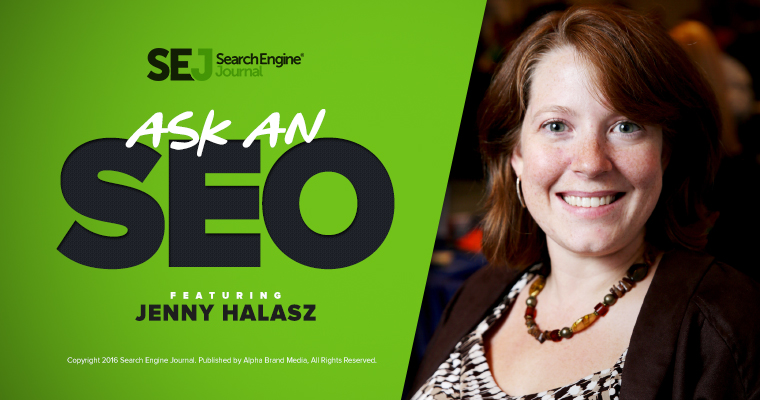Want to ask Jenny an SEO question for her bi-weekly column? Fill out our form or use #AskAnSEO on social media.
We had some more terrific questions this month, so let’s get to them, rapid-fire style!
Will my site have SEO issues if I have two H1 tags of the same title? One will be visible in mobile and the other one is just visible in desktop.
No. Because the H1s will only be visible in one or the other, as long as you’re using a media query command or another similarly supported command to communicate this to the search engine, you won’t have any problems. Even if you had two H1s on a page in desktop, Google will treat the first H1 as the primary and the second one will be treated as regular body text. It’s never something that you’d have significant issues for, even though every major SEO tool will warn you of it.
In terms of on-page SEO structuring- can H3 tags go on top of the page first instead of H1? In the first content of my page is a slider containing titles and excerpts of products. Since it’s a slideshow of products, I’m listing their titles as h3. Then at the next row below the slider is the h1 title of the page. Will my site have issues with Google SEO in the way I structured it?
No. This also won’t cause any issues. Google will know that the H3 appears before the H1 on the page because they fetch the complete code. But the way you describe it, you shouldn’t have any issues. The more pertinent question is – why is the slider appearing before the headline on the page? Is that the best use of space for the users’ experience? I would think you’d want to give them a clear indication of what’s on that page (with an H1) before presenting them with options.
What is the best application/site to track website traffic of competitors?
This is sort of like asking what car is the best, or whether crunchy or creamy peanut butter is better. The answer is there are dozens of tools that provide competitor data at different levels. Some people would say free is better, some would prefer tools where you can earmark certain competitors. Some tools are better for retail and e-commerce, some are better for B2B and lead generation.
SimilarWeb is a good tool. I also like SEMRush, Compete.com, SpyFu, WooRank, and Quantcast. Everyone has their own tastes, and I’m sure our readers will mention more that they love in the comments!
What are the best resources for learning about SEO?
There are too many to name. My favorites are SEOBook, the Moz workshops, and the SEO 101 posts here on Search Engine Journal. The only series I suggest staying away from is Lynda.com, as I’ve watched some of their SEO training, and they seem outdated, with recommendations to use tactics that I would steer you away from.
For in-person training, attend a conference like SEJ Summit, SMX, or Pubcon, and take a masters’ workshop before it starts. I also have to put a plug in for ASPE, a company that I do in-person training with at locations all over the country. The Google Bootcamp class is my favorite, but it covers SEO, PPC, and Analytics. The SEO Bootcamp class might be better for SEO-specifically, but I don’t teach that one.
What are the must-have tools for SEO professionals?
A brain. I’m kidding, but not really, because all tools are just data crunchers. You have to have the right mindset and a clever brain to interpret them. That being said, the tools that I rely on daily are: Screaming Frog, Deep Crawl (for larger sites, longer use), SEMRush (competitive), Majestic (links), and some form of ranking analysis tool (I like Conductor and Searchmetrics).
As long as you have a tool that you like and can rely on in these key areas, you will have what you need.
How can PPC spend impact SEO CTR for generic terms?
Many studies have suggested a top result in both SEO and PPC for the same site can positively impact click through rate. I’ve seen data that has suggested it can have as much as an 8-10% increase, but nothing lately. I don’t put too much stock in these studies because click through behavior varies based on so many things: the ad text/description used, the searcher’s intent, the call to action, even the device type and the screen resolution.
The bottom line for me is that you need to test it. I strongly recommend having a paid presence for branded keywords as well as any non-branded (generic) keywords that you want to always be present for. Because organic results change so frequently and are so dependent on the user, if you want to guarantee you will be seen for a keyword, you need to pay for it.
What is the difference between SERP description when logged-in vs incognito?
Generally, there is no difference based only on this. However, because the description that Google chooses to use isn’t static and varies depending on device type, location, user behavior, etc., you may often see different results when logged in vs. incognito.
My question is about Google penalties. I am new and trying to inform myself as much as I can about white/black hat SEO as to not make any mistakes. I am running a directory website that is new. In exchange of free profile listings for therapists I have only one requirement that is for them to put a back link on their website of our homepage as to gain authority in Google. It is also written on the join us page and now I am wary of this exchange as I do not want Google to penalize the website. Is this considered bad seo in Google’s eyes?
Yes, this is against Google’s guidelines. Please see their answer on “Link Schemes.”
Chances are good that you have already triggered a penalty (manual or filter) as a result of this behavior. You need to communicate with your users that you are discontinuing this practice and making all outbound links nofollow. You need to request that they do the same on their websites.
A good general rule of thumb is to ask yourself if you would feel comfortable telling a Google Search Quality representative what you are doing. If the answer is no or even that you’re not sure, you probably shouldn’t do it.
Thanks as always for your great questions! There were a lot of questions where I offered my opinion this time rather than fact, so please add your thoughts and suggestions in the comments.
Image Credits
Featured Image: Image by Paulo Bobita
In-post Photo: enotmaks/DepositPhotos.com







![[SEO, PPC & Attribution] Unlocking The Power Of Offline Marketing In A Digital World](https://www.searchenginejournal.com/wp-content/uploads/2025/03/sidebar1x-534.png)